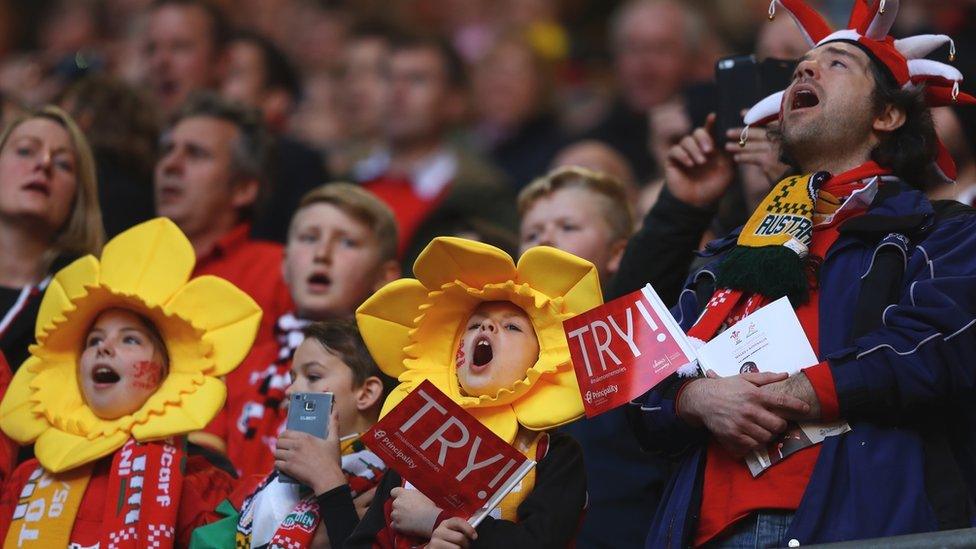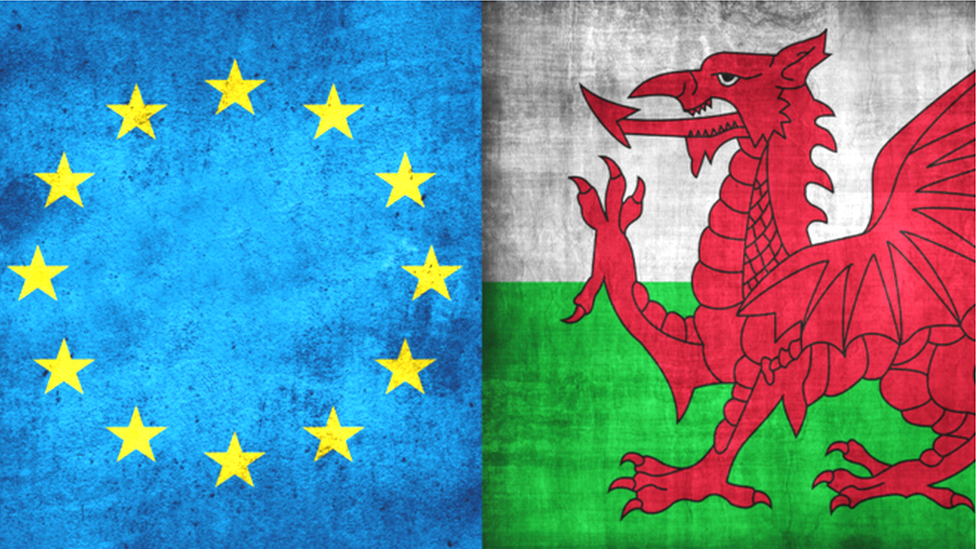How optimistic are people in Wales, BBC survey asks
- Published
- comments

People in Wales feel more optimistic about their nation's future than people in England, a survey for the BBC suggests.
A third of people (33%) thought Wales' best years were still to come, while a fifth (20%) said things were better in the past.
In England almost half (49%) said it used to be better and only 17% thought the nation would improve in the future.
The poll was commissioned by the BBC and carried out by YouGov.
Scottish people appeared to be more optimistic than the English and Welsh: 29% said things were better in years gone by and 36% looked forward to the future.
The survey also found almost eight in 10 (79%) people in Wales strongly identified as British.
Six in 10 (62%) identified strongly as being Welsh.
That difference between the two could be explained by the proportion of the Welsh population born outside Wales - more than a quarter, according to the 2011 Census - the first Census to collect information about national identity.
Around a fifth (21%) was born in England.

The many retired people moving to Wales might be a factor in answers on identity
Manchester University academic Dr Bethan Harries, who has studied the Census data, says the number of retirees who move to Wales could help explain why older people are less likely to say they are Welsh.
Young people are "more likely to be at school, engaging in cultural activities and learning Welsh. That might make them more inclined to identify as Welsh", she said.
"Where we see the greatest shift is at the age of 60.
"At that point we see a much lower proportion of the population identifying as Welsh only and also identifying as Welsh and British.
"There are a couple of reasons for that. Perhaps Welsh identity is less important to older people of that age group.
"But also there is perhaps something in the fact that we have a higher proportion of people who identify as English in that age group than in the younger age groups - suggesting perhaps that people have moved to Wales to retire at a later stage of life and have therefore spent less time in Wales and therefore are perhaps less inclined to identify as Welsh."

A majority of people in Wales said they had no interest in the World Cup in Russia
The BBC's survey showed there was no difference between how strongly Leave and Remain voters in the Brexit referendum identified as being Welsh.
Leave voters, however, were slightly more likely to feel strongly British and much less likely to identify as European.
Although Plaid Cymru voters were the most likely to identify strongly as Welsh among the supporters of the main political parties, 71% of them also said they strongly identified as being British.
During the World Cup in Russia, which starts next week, 18% of Welsh respondents said they would support England, 6% said they would support England's opponents, and more than half (53%) said they had no interest in the tournament.
AMs scored better than MPs when people were asked about politicians in Cardiff and Westminster: 79% did not agree that MPs reflected the concerns of local people, compared to 56% who said the same about AMs.
Of the 1,036 people questioned, 10% thought MPs reflected their concerns, 30% agreed AMs did the same.
Differences between the supporters of the main political parties were revealed by the research, with Labour and Plaid Cymru voters more likely than Conservatives to say the Welsh government should take a range of decisions than the UK government.
A strong majority of Tory voters - 71% - thought the UK government should set the level of income tax, even though their party has devolved powers to vary the tax, compared to 22% who said the Welsh government should do the same.
The poll was conducted for the BBC by YouGov on 25 April to 1 May 2018. Respondents were asked to complete a detailed online questionnaire on identity and belonging. 1036 adults in Wales took part.
- Published3 June 2018
- Published1 March 2018
